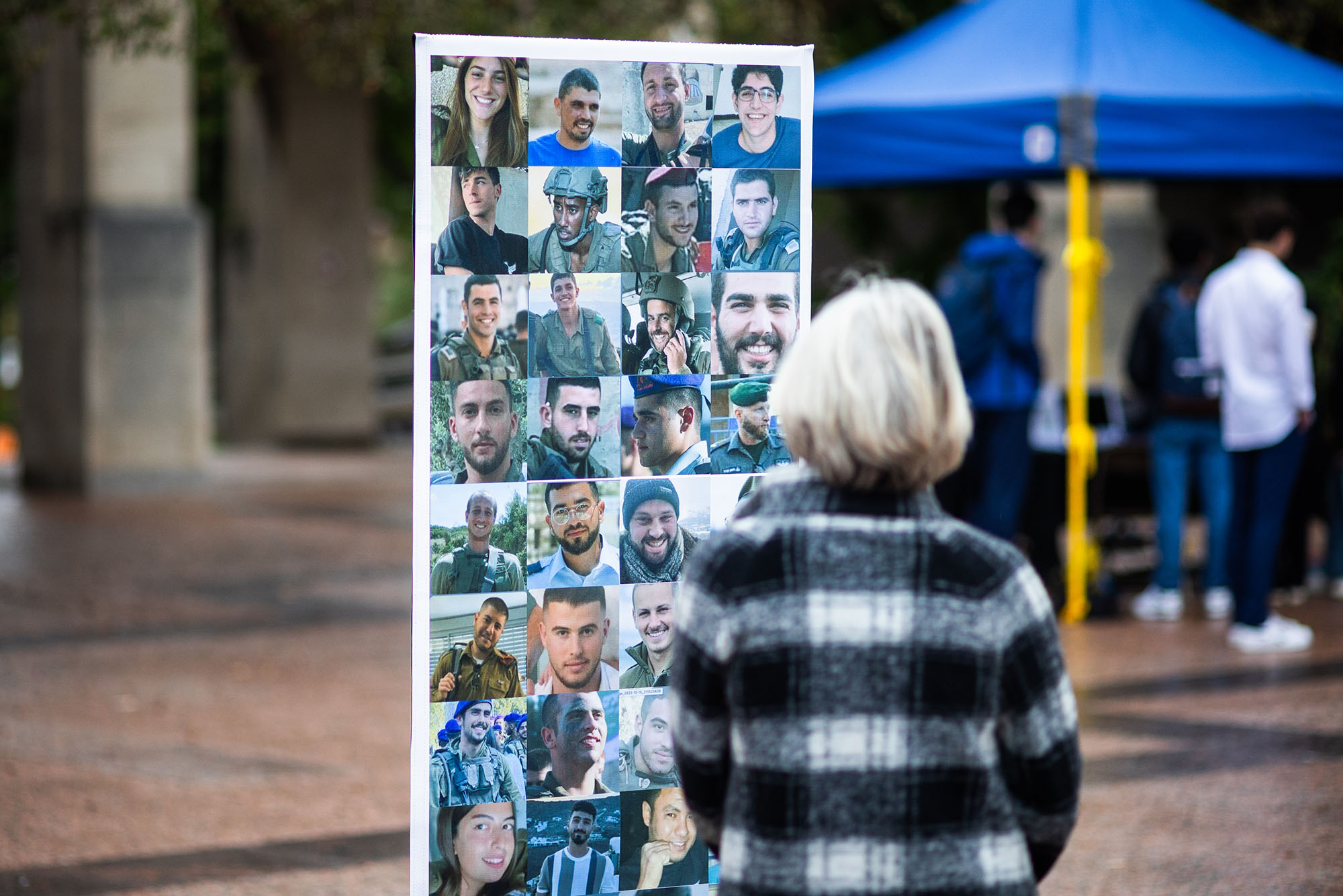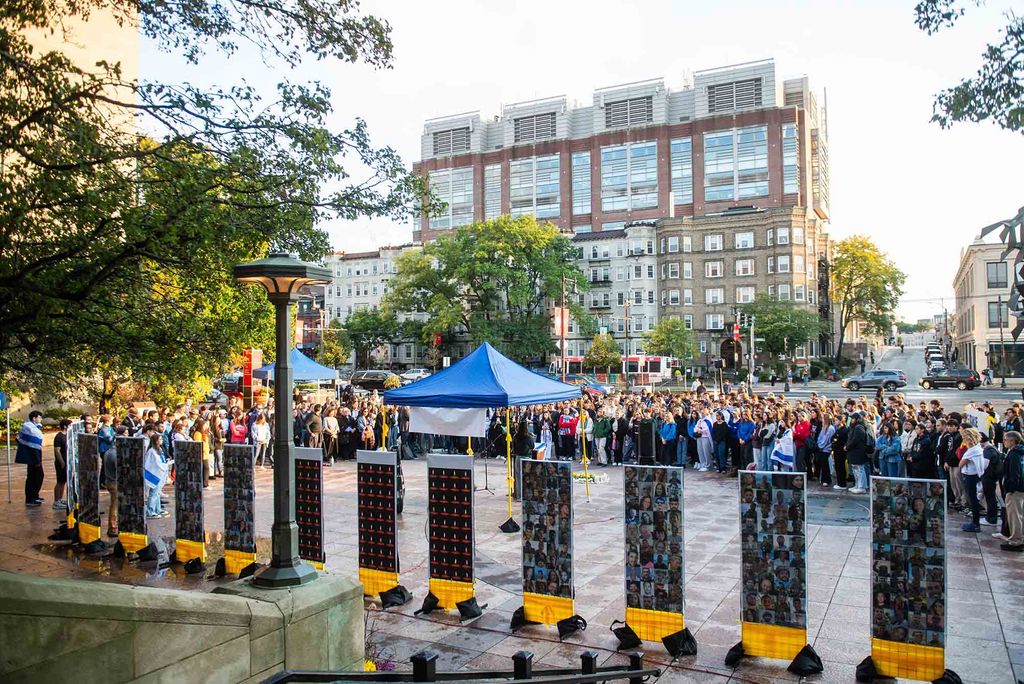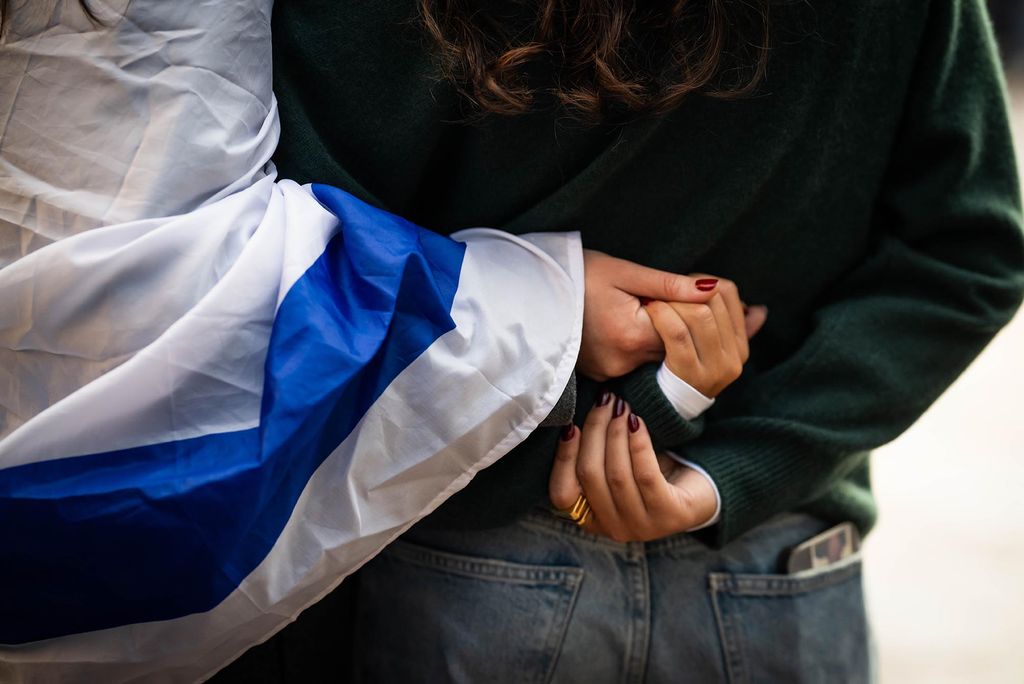Prayers, Photos, Testimonials: BU Grieves a Year of Deaths in the Middle East
Campus observances of first anniversary of October 7 Hamas attack on Israel, triggering Gaza war

The Rev. Robert Allan Hill, dean of Marsh Chapel, led an ecumenical prayer service for peace Monday morning, kicking off a daylong University remembrance of the anniversary of the Hamas attack on Israel. Photos by Eric Haynes
Prayers, Photos, Testimonials: BU Grieves a Year of Deaths in the Middle East
From morning to evening, campus observances of first anniversary of October 7 Hamas attack on Israel, triggering Gaza war
On Monday, the one-year anniversary of the Hamas attack on Israel that killed 1,200 Israelis, triggering a response that devastated the militant group and has left 41,000-plus Gazans dead, Boston University religious and student groups spent portions of the day mourning victims of the mushrooming conflict in the Middle East.
“Let there be peace on earth,” the Rev. Robert Allan Hill, dean of Marsh Chapel, prayed at a small and intimate morning “ecumenical service of prayer for peace” in Marsh Chapel that began the daylong commemoration. “Our one hope, our desired outcome early this morning, is to set a tone for this campus and beyond, for today a tone for this and every day.
Our one hope, our desired outcome early this morning, is to set a tone for this campus and beyond for today, a tone for this and every day.
“To set a tone—brief, ecumenical, service, prayer, peace.”
Amid a dreary drizzle outside and the sorrow of war news, the prayer service struck notes of hope and gratitude for blessings. Among the small group of attendees was BU President Melissa L. Gilliam. Somber music was played by cellist Ga Eun Lee and chapel music director and pianist Scott Allen Jarrett (CFA’99,’08). After each speaker, the audience observed a moment of silence.
The service was prelude to a daylong exhibition on the plaza by Boston University Hillel and a week of commemorative events on campus by other groups, including BU Students for Justice in Palestine.
Hill, who is also a professor of New Testament and pastoral theology at the School of Theology, recited Psalm 139, which praises God: “Whither shall I go from thy spirit? Whither shall I flee from thy presence?…Thy right hand shall hold me.”
The October 7, 2023 Hamas assault was the deadliest attack on Jews since the Holocaust. Hamas continues to hold 100 Israelis hostage. Israel’s counteroffensive has killed more Palestinians than any conflict since 1948 and may be expanding into a broader war as the Jewish state battles Lebanon-based Hezbollah militants.
“Let us give thanks to God for his gifts so freely bestowed upon us,” said Nagla Abdalla, BU’s Muslim chaplain. “All praise is for Allah—Lord of all the worlds… He is the One Who provides me with food and drink. And He alone heals me when I am sick. And He is the One Who will cause me to die, and then bring me back to life.”
Barbara Green-Glaz (CFA’87,’90), PERD manager of family programs and sports and a member of Marsh’s Religious Life Council, which advises Hill, read a Native American prayer: “We pray that someday, an arrow will be broken, not in something or someone, but by each of humankind, to indicate peace, not violence… Then the eagle will carry our prayer for peace and love, and the people of the red, white, yellow, brown, and black communities can sit in the same circle together to communicate in love.”
The Rev. Karen Coleman, chaplain for Episcopalian students, prayed: “When all is said and done, the only true measure of our lives is how well we loved. How well we gave love, received love, shared love, protected love, created love… We were made to love, you and I, made so by the author of love, made in the image of love to be the love we are.”
Also offering supplications were Jonathan Lee, associate chaplain for student outreach, and Rev. Kevin Staley-Joyce, Roman Catholic chaplain.


Before the service, BU Hillel erected photo displays on Marsh Plaza, memorializing victims of last year’s attack and the ensuing war—“civilians, soldiers, and hostages,” Deborah Glickman, Hillel chief operating officer, says.
At 5 pm Monday, a crowd of mourners gathered on Marsh Plaza to honor and remember the Israeli lives lost in the October 7 attacks. The plaza was ringed with the photos and names of those who died in the attack and the ongoing war, and those who were taken hostage.
A crowd of approximately 200—some draped in Israeli flags—stood in solidarity at the vigil hosted by Boston University Hillel and Boston University Students for Israel.


Approximately 200 people gathered on Marsh Plaza at 5 pm on Monday for a vigil sponsored by Boston University Hillel and Boston University Students for Israel. Photos by Jackie Ricciardi
“We come together in mourning. A year ago, our lives changed,” said Shayna Dash (Wheelock’26), president of BU Students for Israel. Dash, and others who spoke at the vigil, described friends and loved ones who were lost in the attack, and the many reverberations that continue today. Refrains such as “Bring them home now,” and “Never again,” echoed throughout the crowd, many of whom were moved to tears. “I hope that someday, ‘never again’ is not just a mantra,” Dash said. The event concluded with a moving performance of the Israeli national anthem.
BU Students for Justice in Palestine also scheduled a series of commemorations for the day, including an event indoors at the Center for Gender, Sexuality & Activism (775 Commonwealth Ave.) to write the names of Palestinian dead, from noon to 7 pm (the writing of the names will continue on Marsh Plaza daily from noon to 5 pm through Friday). And prayers for Palestine at 7:30 pm and an 8 pm community vigil were held on the BU Beach.
At that vigil, a crowd gathered to mourn the loss of Palestinian citizens since the October 7 attack. About 250 people stood together beneath Palestinian flags, surrounding a handwritten list of the dead that stretched for several yards along the grass. Many of the people who attended the vigil, which was organized by the Boston University chapter of Students for Justice in Palestine, carried electric votive candles and wore keffiyehs in solidarity.


An 8 pm vigil on the BU Beach hosted by BU Students for Justice in Palestine drew a crowd of approximately 250 Monday evening. Photos by Cydney Scott
“We stand here today in mourning; we rise tomorrow in resistance,” said Leena, a BU student affiliated with the group who declined to provide her last name for fear of doxxing. Many who spoke honored the friends and loved ones who died in the ongoing conflict, as well as shared poems and songs.
A small counterprotest sprung up during the vigil. Less than a dozen young people waving Israel flags approached the gathering and were moved back by the BUPD.
A rally for Palestine will be held Friday on Marsh Plaza at 2:30 pm.
BU’s Center on Forced Displacement and its Institute on Culture, Religion, & World Affairs will host a panel, The University after October 7, on Tuesday, October 8, from 3 to 5 pm at the Howard Thurman Center for Common Ground (808 Comm Ave). Scott Taylor, dean of the Pardee School of Global Studies, will moderate a discussion by BU faculty, and Northwestern University political scientist Wendy Pearlman will keynote the event, which is open to all students, faculty, and staff. Find information and registration here.
Comments & Discussion
Boston University moderates comments to facilitate an informed, substantive, civil conversation. Abusive, profane, self-promotional, misleading, incoherent or off-topic comments will be rejected. Moderators are staffed during regular business hours (EST) and can only accept comments written in English. Statistics or facts must include a citation or a link to the citation.